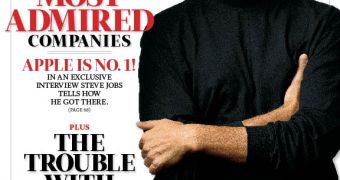It has recently been revealed that a June 2005 commencement address at Stanford University saw Apple's CEO telling students that "About a year ago," he was "diagnosed with cancer." The moving story would have made the history books, hadn't it been a big fat lie, as Jobs first found out about his pancreatic cancer in October 2003, says Fortune magazine.
The surgery Jobs faced, known as the "Whipple procedure," is "brutal and complex," according to the mag, with removing parts of the pancreas, bile duct, and intestines, then reconstructing the digestive tract. The procedure lasts six hours or more, but it's "relatively safe: Mortality from the surgery is less than 5% at specialized medical centers with surgeons who have performed it many times," says CNN Money.
As soon as he found out that he was suffering from a form of pancreatic cancer, Steve told Apple not to spread the word, so shareholders wouldn't have reasons to "panic." It wasn't until 9 months later (during which Jobs treated himself with herbs) that he let the world know about his (possibly fatal) illness.
Jobs finally had the surgery at the end of July in 2004. Fortune informs that he decided to go forth with the operation earlier that month. What could have prompted stubborn ol' Jobs to finally proceed with the operation? A scan of his abdominal cavity, which revealed growth in the tumor. Sources later informed that the surgery was a success.
Job's speech at Stanford University...: "About a year ago, I was diagnosed with cancer. I had a scan at 7:30 in the morning, and it clearly showed a tumor on my pancreas.... The doctors told me this was almost certainly a type of cancer that is incurable, and that I should expect to live no longer than three to six months.... Later that evening I had a biopsy where they stuck an endoscope down my throat, through my stomach into my intestines, put a needle into my pancreas and got a few cells from the tumor. I was sedated, but my wife, who was there, told me that when they viewed the cells under a microscope, the doctor started crying, because it turned out to be a very rare form of pancreatic cancer that is curable with surgery. I had the surgery, and, thankfully, I am fine now."
Two things: one, Jobs had actually found out about his illness earlier which should have prompted him to disclose the "vital" information to its shareholders, and two, he didn't act on it immediately as he tries to suggest, leaving a gap of more than 9 herbal months unmentioned.
According the aforementioned sources, an activist institutional investor, going by the name of Ralph Whitworth, served as chairman of Waste Management when the company's CEO was stricken with a fatal brain tumor. The issue is "a very tricky one," he stated. Nevertheless, in his opinion, Apple should have disclosed its CEO's illness as soon as it was revealed to them, even if the law didn't force them to: "Good governance has nothing to do with following the minimum standards," says Whitworth. "Executives should announce before they're going into major surgery. Yes, your stock will go down. [But] how would the shareholders have felt if they said he died on the operating table? "
Former SEC chairman Levitt also reckons that Apple should have acted promptly upon acknowledging Steve's illness, confidently stating that "clearly if a CEO is going in for major surgery, that's a disclosable item."

 14 DAY TRIAL //
14 DAY TRIAL //